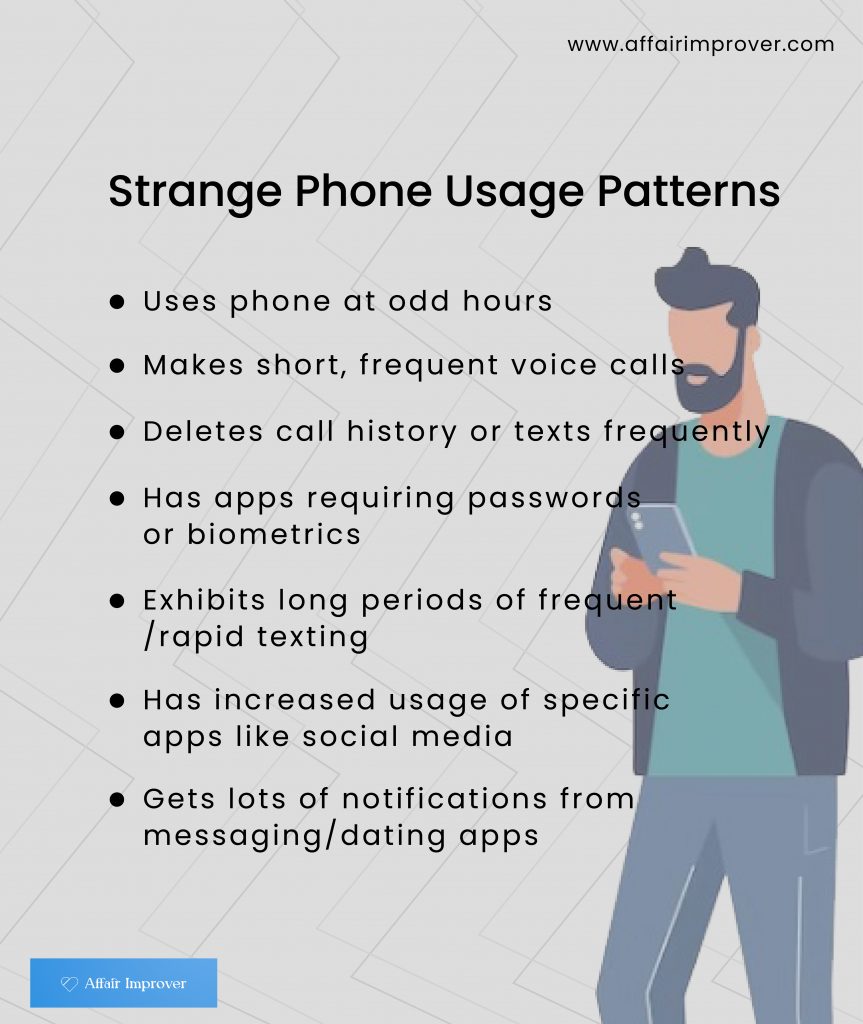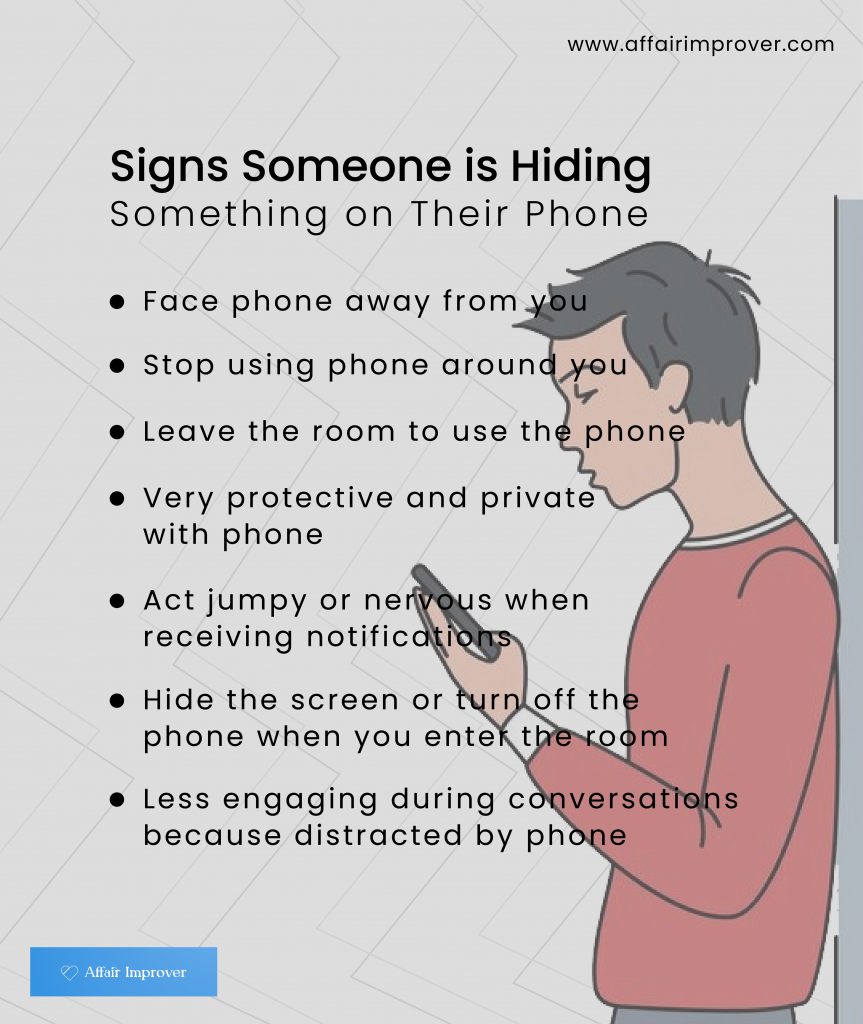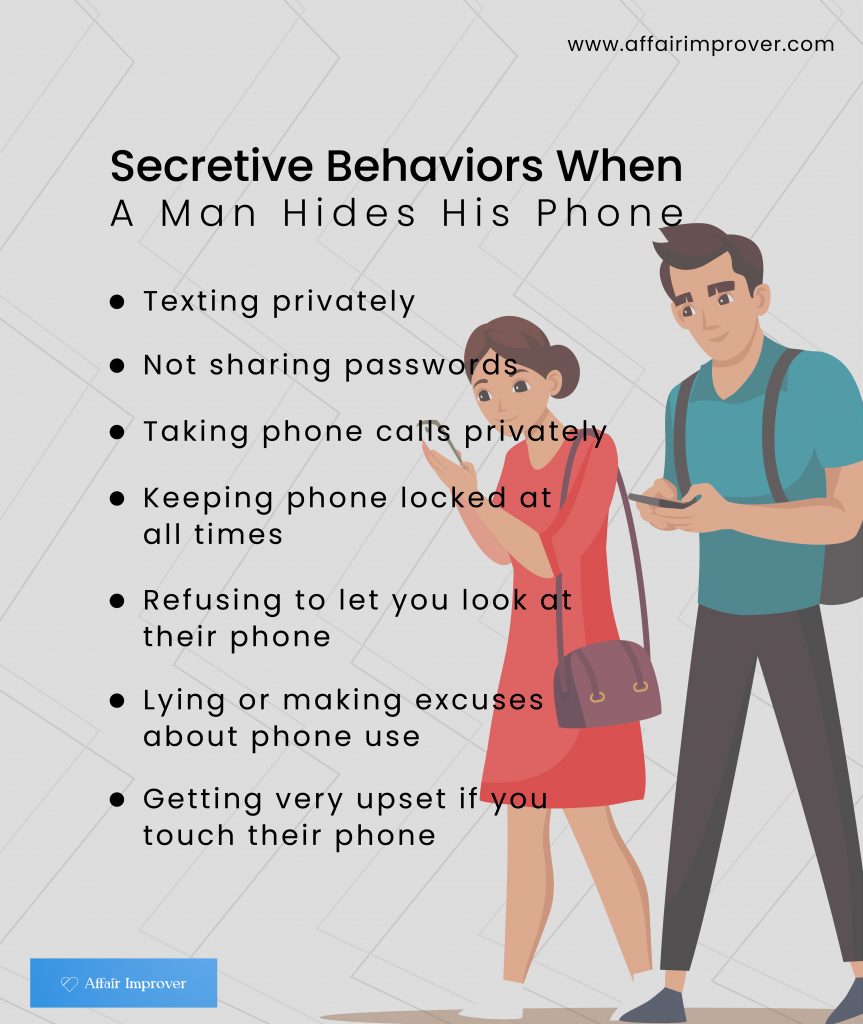In today’s tech-savvy world, our cell phones have become extensions of ourselves, housing our most intimate conversations, browsing histories, and personal data. So it’s no surprise that six out of ten people who suspect their partner is hiding something on their phone end up discovering inappropriate messages, calls, or online activities, according to statistics. While privacy is crucial, drastic changes in phone usage or secrecy can be red flags that your significant other is concealing something on their device.
This comprehensive guide will outline common signs someone is hiding something on their phone, such as increased app usage, defensiveness, password changes, and secretiveness. However, it’s essential to tread carefully and avoid jumping to conclusions that could damage trust. Instead of confronting your partner head-on, consider leveraging a reliable cell phone tracker to discreetly monitor their activities without invading their privacy. With care, communication, and the right tools, it may be possible to uncover the reasons behind perceived deception and rebuild trust in your relationship.
DID YOU KNOW?
56% believe that sharing online or mobile passwords is a contemporary indication of genuine love. Among couples, four out of ten members frequently sneak a peek at their partner’s phone. Compared to men (36%), women (44%) are more likely to spy on a partner’s phone.
- Signs He’s Hiding Something on His Phone: Behavioral Changes
- Signs She is Hiding Something: Strange Phone Usage Patterns
- Secretive Behaviors When a Man Hides His Phone
- How to Find What He’s Hiding on His Phone?
- Phone Security Changes
- Conclusion
- Signs Someone Is Hiding Something On Their Phone Infographics
- Sources:
Signs He’s Hiding Something on His Phone: Behavioral Changes
Changes in normal behaviors surrounding phone use can be early red flags that a partner may be hiding something on their device. Increased protectiveness, distraction, and attempts to use the phone privately may indicate secrets. Here are some behavioral signs he’s hiding something on his phone to look out for.
Less engaging during conversations because distracted by phone
If your partner seems distracted, detached or disconnected during conversations because they’re focused on their phone, it could mean they are engrossed in a private chat or app they don’t want you to see. Their attention may shift frequently to their phone even when speaking with you.
Very protective and private with phone
A partner who suddenly keeps their phone extremely close at all times, doesn’t let it out of their sight, and holds it at angles to shield the screen could be exhibiting secretive behaviors. This protectiveness of the phone and need for privacy can imply they’ve got content on there they don’t want you accessing.
Stop using phone around you
Someone who previously would use their phone freely in your presence but now puts it away or avoids using it near you may be hiding certain apps and features they don’t want you stumbling upon. That is one of the obvious signs he’s hiding something from you on his phone. This change in phone use when you’re around signals they’ve possibly got private messages or content they’re intentionally concealing from you.
Leave the room to use the phone

Similarly, if your partner frequently leaves the room to text, take calls, or use apps, it can be a sign they need privacy to access communications and content they want to hide. Excuses like needing better reception may cover up this evasive behavior. Acting secretively when frequently leaving the room to use their phone are key cell phone cheating signs that could imply private actions like texting or apps usage they want to conceal from you. Getting lots of notifications from messaging/dating apps can signal hidden conversations and connections through these services.
Face phone away from you
Angling the phone away from your line of sight or cupping their hand around the side can allow someone to use their phone while obscuring notifications and hiding the screen. This furtive behavior belies a fear you might catch a glimpse of something private.
Act jumpy or nervous when receiving notifications
One more telltale way how to tell if your boyfriend is hiding something on his phone. Unexpected notifications from certain apps can trigger behaviors like sudden screen-glancing or rapid phone flipping as they check to see if you noticed. Nervous energy around incoming alerts implies they contain content they wish to conceal.
Hide the screen or turn off the phone when you enter the room
A partner who locks or turns off their phone screen tosses it out of sight, or angles it away when you enter a room they’re in could be hiding recent app or messaging usage. These defensive behaviors occur because they want to prevent you from seeing private content.
Signs She is Hiding Something: Strange Phone Usage Patterns

Along with behavioral changes, patterns like increased app usage, frequent messaging or shady deletions can be potential evidence of hiding activities on one’s phone. Take notice if you notice such signs she is hiding something after your partner:
Exhibits long periods of frequent/rapid texting
Extended phone sessions involving hastily typed messages can mean involved communication with a third party they want to be kept a secret. The rapid pace can signal an intent to delete the texts, which may reveal a hidden conversation.
Has increased usage of specific apps like social media
Sudden spikes in app usage like Facebook, Instagram, or Snapchat could indicate private communications through those platforms. The uptick in activity may stem from chatting or sharing content with someone they don’t want you to know about.
Gets lots of notifications from messaging/dating apps
Frequent notifications from messaging apps or dating sites can be the most telltale signs she is really hiding something. The influx of alerts can signal hidden conversations and connections through these services.
Uses phone at odd hours
Late night or early morning phone activity can involve contacting people at times you’re less likely to notice. Secretive usage during these hours may facilitate a deception.
Makes short, frequent voice calls
A pattern of brief but repeated calls can allow for hastier, less detectable communications versus long phone conversations. This could enable secret discussions while arousing less suspicion. Learning how to tell if someone is lying through text can help reveal deceptions in these short, frequent digital interactions.
Deletes call history or texts frequently
Partners who suddenly clear their call logs or text histories may be hiding communications they don’t want you to see. These deletions allow them to conceal specific phone activities and are one of the most obvious ways how to tell if your girlfriend is hiding something on her phone.
Has apps requiring passwords or biometrics
The addition of passcodes, fingerprints or face scans to access certain apps can prevent you from accessing private messages and content within those apps. This phone security boost hides communications.
Secretive Behaviors When a Man Hides His Phone

The secrecy surrounding phone actions involves behaviors deliberately designed to conceal the activity. Partners who become more surreptitious when using their phones likely have content they wish to hide. Watch for these actions when a man hides his phone:
Refusing to let you look at their phone
A flat “no” when asked to see their phone implies they need to hide content that viewing would reveal. Unwillingness to provide access contradicts typical relationship openness.
Keeping phone locked at all times
Whereas an unlocked phone signals nothing to hide, constantly keeping it locked indicates an intention to conceal. This shields private content from discovery. Cheating apps can also facilitate secret communications that individuals aim to hide from their partners.
Not sharing passwords
Partners who previously shared passwords but now refuse may have apps or features needing password access they don’t want you accessing. Refusal hides their activity.
Taking phone calls privately
Stepping away to take calls could conceal the caller’s identity and the content of conversations they wish to keep secret. Their privacy implies the call contains sensitive information. Or, they can share their phone with you. However, don’t be surprised to think, “My boyfriend’s phone is too clean,” then.
Texting privately
Leaving the room before texting or angling the phone prevents you from identifying recipients and reading message content. They likely intend to delete texts as well.
Lying or making excuses about phone use
Evasive reasons given about their phone use, like claiming social media addiction or obsessive work emails, are likely covers for hiding the real reasons. Dishonesty hints at deception.
Getting very upset if you touch their phone
Extreme defensiveness or anger when you pick up, move, or use their phone could indicate a fear you’ll uncover hidden content. Their reaction signifies something private to conceal.
How to Find What He’s Hiding on His Phone?

You can simply tell your partner about your concerns.
However, watch their reaction! It is a priceless way how to find what secrets he’s hiding on his phone. When confronted about possible phone hiding, defensive behaviors aim to deny, deflect, justify, or shift blame. This includes:
Overreacting to questions about phone use
Anger, or exaggerated responses to simple queries about phone habits that aim to intimidate you from asking further. Their intensity conceals something. They may yell, storm off, or adamantly refuse to discuss it. This dramatic reaction discourages you from pursuing valid concerns.
Accusing you of spying if you ask about phone
Claiming genuine concerns is snooping or controlling accusations; flip the blame back on you. It distracts from their own possible hiding. They’ll insist caring questions are possessive demands, putting you on the defensive. This makes you hesitant to raise worries. There are many ways how to find what he’s hiding on his phone, and you can try applying one of those. Why do you have to be blamed for nothing when, instead, you can really use a spy app to snoop into their phone and get all the information out there?
Projection – accusing you of hiding things on your phone
Accusing you of secretive phone use projects their own behaviors onto you. This diverts suspicion and conceals their own deception. Baseless accusations shift the focus to imagined secrets on your phone versus theirs.
Gaslighting – denying strange phone behaviors
Partners may insist you misremembered their suspicious phone habits, causing you to doubt yourself. This creates confusion to hide real secrecy. Asserting imagination or faulty memory covers deceit by destabilizing your perceptions.
Blaming you for “pushing them away” if you express concerns
Making you out to be needy or driving them away flips their hiding into your fault for even having a thought, “Why is my boyfriend so secretive with his phone?” This distraction aims to stop you from questioning them further. They’ll claim your doubts make them want distance, pressuring you to drop concerns to keep closeness.
DID YOU KNOW?
Gaslighting is a form of psychological manipulation where the abuser attempts to sow self-doubt and confusion in the victim. National Domestic Violence Hotline indicated that 74% of female victims of domestic violence experienced gaslighting by their partner. The goal is to destabilize the victims’ perceptions and make them question their own reality and memory. Some examples of gaslighting behaviors are:
- Denying events or conversations that took place that the victim clearly remembers:
“I never said I would be home at 6 pm, you must be imagining things.”
- Trivializing or denying the victim’s feelings or experiences:
“You’re too sensitive, I wasn’t flirting with that person.”
- Projecting false information onto the victim:
“You’re the one who lost my keys, you’re always misplacing things.”
- Suggesting the victim has memory problems:
“I’ve told you many times I don’t like Italian food, your memory must be going.”
- Outright lying about circumstances the victim can clearly recall:
“I did not have plans with my friends tonight, you are making that up.”
The cumulative effect of these distortions, denials, and accusations is to erode the victim’s confidence in their own perceptions, memories, and beliefs. The victim starts doubting their own reality and accepting the abuser’s false version of events. Gaslighting is an insidious form of control.
Phone Security Changes
When people have content they want to conceal, they often ramp up phone security settings and behaviors. Watch for actions like:
- New passwords/passcodes: Partners who change passwords or set new passcodes you don’t know aim to block access to apps and accounts hiding private messages or content.
- Enabling biometrics like fingerprint scans: Adding fingerprint or face recognition creates another layer of security preventing access to their phone. If these measures still leave you wondering about secrecy, options like learning how to track your wife’s phone legally may uncover issues.
- Deleting messages immediately: Disappearing messages on apps like Snapchat or immediately deleting texts and logs prevents evidence of hidden conversations. This covers tracks.
- Using privacy/temporary messaging apps: Encrypted apps like WhatsApp or temporary message services like Snapchat allow secret communications without evidence. This facilitates deception.
- Using private browsing: Private browsing prevents histories from being saved, deleting evidence of searches or sites relating to deception. It conceals activity.
- Clearing browser history frequently: Frequent history clearing also deletes records of potentially revealing activity and raises suspicion of hiding.
- Not saving contacts: Avoiding saving contacts can prevent you from identifying sources of calls or texts that could reveal deception. It hides connections.
Conclusion
Increased protectiveness, strange usage patterns, secrecy, and defensiveness can signal a partner is hiding something on their phone. If you even have thought, “My husband gets mad when I look at his phone,” something might be wrong. However, jumping to conclusions only damages trust. Have an open talk expressing worries without accusations. Using, for instance, spyware can uncover reasons like online affairs and provide you with real information about his behavior. It’s possible to move past perceived deception with care and communication, but snooping will only worsen the damage. Pay attention to changes, but avoid jumping to conclusions without proof. Honesty and patience are key in strengthening bonds strained by suspected phone hiding.
Signs Someone Is Hiding Something On Their Phone Infographics






